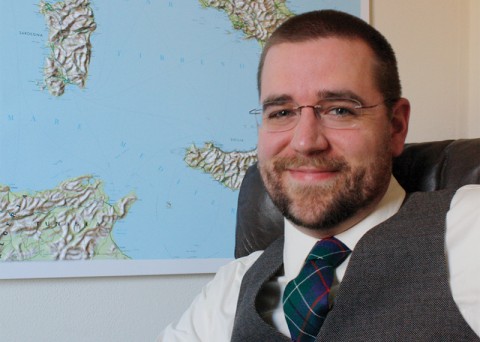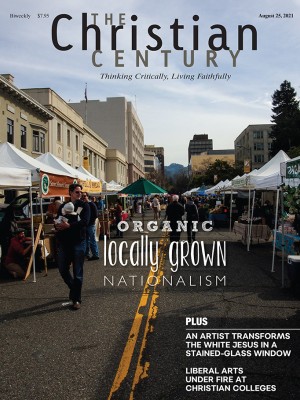The Revolutions podcast makes history accessible through storytelling
“Podcasting offers a unique medium for improving a person's historical understanding while they're doing the dishes.”

Read Dueholm’s article on Duncan’s podcast
Why is podcasting a good medium for history?
History often winds up being storytelling. Podcasting offers a unique medium for improving a person’s historical understanding while they are doing dishes or exercising. They can go away mentally to think about something else. Many people tell me that history was not their favorite subject in school, but when they got older, they realized they don't know much about the past and they are interested.
Why did you choose to do a podcast on historical revolutions?
As I started reading about the Mexican Revolution, the Russian Revolution, and the American Revolution, I conceived of the idea of telling the story of these great political revolutions together. Like my previous podcast, The History of Rome, Revolutions is focused on power: how it is acquired, maintained, or overthrown. I also wanted to tell stories that a lot of people don’t know. People come up to me and say they didn’t know the Haitian Revolution happened. It’s gratifying to shine spotlights on history that, at least in the United States, is often forgotten or ignored.
Read our latest issue or browse back issues.
How do the stories of less well-known revolutions change our understanding of this period of revolutionary upheaval?
Alexander Hamilton, James Madison, and Thomas Jefferson were very aware of what was happening in the Caribbean and in South America. The United States has always been integrated with Jamaica and Haiti, with the Dominican Republic and Venezuela. Simón Bolívar was trying to be the George Washington of South America. Isolated national histories never tell a complete story. It’s an artificial and untrue depiction.
The Marquis de Lafayette, who was involved in both the American and French Revolutions, came back to the United States. He and George Washington’s step-grandson sent a pair of Washington’s pistols to Bolívar because, in their minds, he had picked up the mantle of Washington’s liberatory cause in South America. Bolívar writes back, saying, in essence, “Nothing fills me with more joy than to have you sending these things to me.” These guys were not only alive at the same time, they were in contact with each other.
Who is someone you’ve particularly enjoyed introducing or reintroducing to listeners?
I did enjoy exploring Pancho Villa. In the United States, he is caricatured as a bandit wearing rifles and a poncho and being a complete mess. But Pancho Villa was a genius. He could have become the president of Mexico. When he “invaded” the United States—and you might think, “Who’s this crazy, tequila-swilling bandit trying to invade Texas?”—his goal was to provoke the United States into coming into Mexico to delegitimize the regime. The whole thing was brilliantly concocted.
None of the revolutionaries are cardboard cutouts. None of the rulers are cardboard cutouts. They had complex motivations and goals.
Your new book, Hero of Two Worlds, is about the Marquis de Lafayette. Why did you focus on him?
A lot of Lafayette biographies treat his life and career as if it ended after the French Revolution. At the beginning of the French Revolution he is a radical, then he becomes a moderate, and then a new branch of radicals accuse him of being a traitor and a conservative so he gets expelled and winds up in an Austrian prison for five years. As they tell the story, he gets out of prison, goes to his farm, has a nice tour through the United States, and then he dies.
But as I traced the story of Lafayette through the Napoleonic era and then the 1820s, I could see he was all over the place. He was in the Chamber of Deputies when it came time to overthrow Napoleon; he was in the middle of the underground liberal and radical Carbonari movements trying to revive revolutionary liberalism after the reactionary turn in Europe. He was an opposition deputy to Charles X, and he was deeply involved in the revolution of 1830. He was still writing letters on his deathbed. “Oh I can’t make it to the Chamber of Deputies, I’ve got this cold I can’t shake.” He never did retire.
What aspect of his story were you most excited to research and share?
His relationship with slavery and emancipation. From the start of the United States, there was a tension between liberty and slavery. In 1783, right after the end of the revolution, Lafayette committed himself to abolitionism. He says that the project of liberty and equality we fought for will never be complete until we’ve eliminated African slavery. His relationship with slavery and emancipation becomes very complicated. For example, he bought a plantation in South America specifically to free the enslaved people, but he never got around to doing that before the French Revolution started—so that tension is within him, too.
Are there other history podcasts you’d recommend to your listeners?
Tides of History, by Patrick Wyman. Now & Then, by Joanne Freeman and Heather Cox Richardson—this one is brand new. Footnoting History, produced since 2013 by a rotating cast of historians. Stuff You Missed in History Class, by Holly Frey and Tracy V. Wilson—giant in the field, an all-time great. The Humanity Archive, by Jermaine Fowler.
A version of this article appears in the print edition under the title “Revolutionaries in context.”





